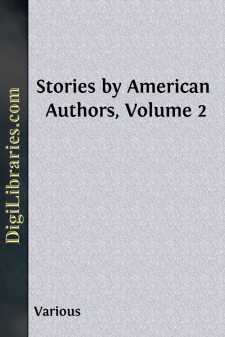Categories
- Antiques & Collectibles 13
- Architecture 36
- Art 48
- Bibles 22
- Biography & Autobiography 813
- Body, Mind & Spirit 142
- Business & Economics 28
- Children's Books 17
- Children's Fiction 14
- Computers 4
- Cooking 94
- Crafts & Hobbies 4
- Drama 346
- Education 46
- Family & Relationships 57
- Fiction 11829
- Games 19
- Gardening 17
- Health & Fitness 34
- History 1377
- House & Home 1
- Humor 147
- Juvenile Fiction 1873
- Juvenile Nonfiction 202
- Language Arts & Disciplines 88
- Law 16
- Literary Collections 686
- Literary Criticism 179
- Mathematics 13
- Medical 41
- Music 40
- Nature 179
- Non-Classifiable 1768
- Performing Arts 7
- Periodicals 1453
- Philosophy 64
- Photography 2
- Poetry 896
- Political Science 203
- Psychology 42
- Reference 154
- Religion 513
- Science 126
- Self-Help 84
- Social Science 81
- Sports & Recreation 34
- Study Aids 3
- Technology & Engineering 59
- Transportation 23
- Travel 463
- True Crime 29
Stories by American Authors, Volume 2
by: Various
Categories:
Description:
Excerpt
The country residence of Mr. John Hinckman was a delightful place to me, for many reasons. It was the abode of a genial, though somewhat impulsive, hospitality. It had broad, smooth-shaven lawns and towering oaks and elms; there were bosky shades at several points, and not far from the house there was a little rill spanned by a rustic bridge with the bark on; there were fruits and flowers, pleasant people, chess, billiards, rides, walks, and fishing. These were great attractions, but none of them, nor all of them together, would have been sufficient to hold me to the place very long. I had been invited for the trout season, but should, probably, have finished my visit early in the summer had it not been that upon fair days, when the grass was dry, and the sun not too hot, and there was but little wind, there strolled beneath the lofty elms, or passed lightly through the bosky shades, the form of my Madeline.
This lady was not, in very truth, my Madeline. She had never given herself to me, nor had I, in any way, acquired possession of her. But as I considered her possession the only sufficient reason for the continuance of my existence, I called her, in my reveries, mine. It may have been that I would not have been obliged to confine the use of this possessive pronoun to my reveries had I confessed the state of my feelings to the lady.
But this was an unusually difficult thing to do. Not only did I dread, as almost all lovers dread, taking the step which would in an instant put an end to that delightful season which may be termed the ante-interrogatory period of love, and which might at the same time terminate all intercourse or connection with the object of my passion; but I was, also, dreadfully afraid of John Hinckman. This gentleman was a good friend of mine, but it would have required a bolder man than I was at that time to ask him for the gift of his niece, who was the head of his household, and, according to his own frequent statement, the main prop of his declining years. Had Madeline acquiesced in my general views on the subject, I might have felt encouraged to open the matter to Mr. Hinckman, but, as I said before, I had never asked her whether or not she would be mine. I thought of these things at all hours of the day and night, particularly the latter.
I was lying awake one night, in the great bed in my spacious chamber, when, by the dim light of the new moon, which partially filled the room, I saw John Hinckman standing by a large chair near the door. I was very much surprised at this for two reasons. In the first place, my host had never before come into my room, and, in the second place, he had gone from home that morning, and had not expected to return for several days. It was for this reason that I had been able that evening to sit much later than usual with Madeline on the moonlit porch. The figure was certainly that of John Hinckman in his ordinary dress, but there was a vagueness and indistinctness about it which presently assured me that it was a ghost. Had the good old man been murdered? and had his spirit come to tell me of the deed, and to confide to me the protection of his dear——? My heart fluttered at what I was about to think, but at this instant the figure spoke.
“Do you know,” he said, with a countenance that indicated anxiety, “if Mr. Hinckman will return to-night?”
I thought it well to maintain a calm exterior, and I answered:
“We do not expect him.”
“I am glad of that,” said he, sinking into the chair by which he stood. “During the two years and a half that I have inhabited this house, that man has never before been away for a single night. You can’t imagine the relief it gives me.”
And as he spoke he stretched out his legs and leaned back in the chair. His form became less vague, and the colors of his garments more distinct and evident, while an expression of gratified relief succeeded to the anxiety of his countenance....












